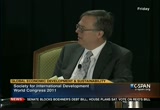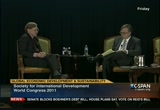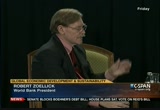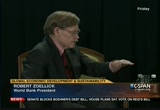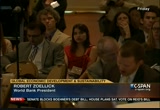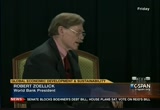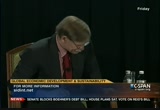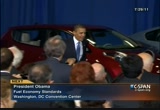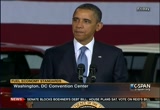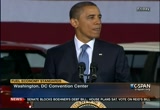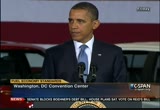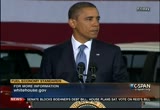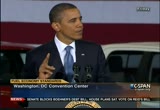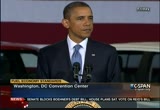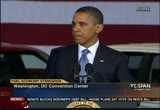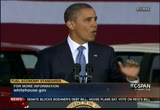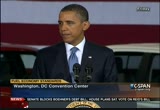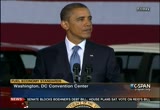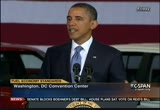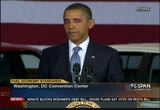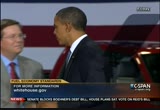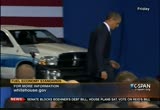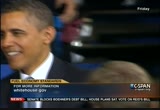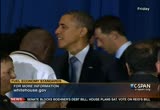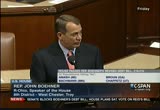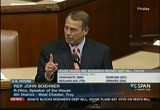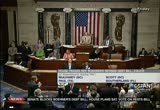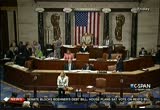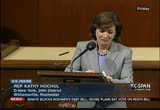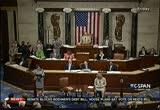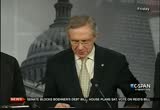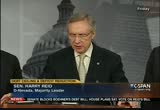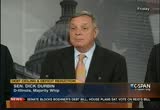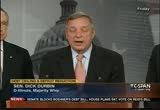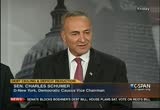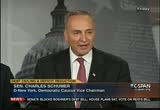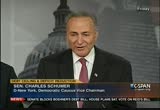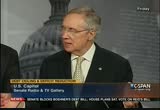tv Politics Public Policy Today CSPAN July 30, 2011 6:00am-7:00am EDT
6:00 am
sourcing issues can help us of the development side. another area is nutrition and agriculture. you talked about agriculture. people here are knowledgeable. there is a lot of effort just to try to interconnect these issues without getting bogged down we look at that as not good for economics or for pluralism, but it is rational and some of those contacts. >> one other sense on this, often the community with the
6:01 am
best of intentions overwhelm countries with very modest capacities. another simple thing that we learn, we have on a series of multi owner trust funds. there is one in the southern sudan. these are critical because if a country has 40 donors and each one is the wrong problem, they -- each one have their own program, they have a hard time getting basic staffing. so they get overwhelmed. it makes much more sense to put the money into one pot, add the country or on its priorities so -- work with the country on its priority some that they on it, help them build the capacity, and then be very careful in terms of trying to improve the governance and transparency and others so that the money goes where it needs to go. >> here is another question. what is the bank doing to promote the rights and status of women at the policy level? >> i referenced a little that about the gender report that we will have coming out in september.
6:02 am
i hope this will move us to another stage, but over the past two years, we have been trying to get people around the world to understand the basic concept, which is that gender equality is smart economics. let's start with the basic concept, if you take 50% of your people, and you do not allow them to reach the potential, it is probably not good for your economy. the reason i start with the smart economics is that in societies around world, they come into different concept of roles and families and men and women, but what i have found is that it can be the poorest villagers in afghanistan or somebody in europe there realizes that the facts show you that this leads to better economic development. it leads to more income for a family. and that starts to drive a whole series of willingness to engage women more effectively. we're looking at issues of everything from the effect on
6:03 am
world schooling -- girl schooling, the infant mortality issues, maternal health issues, a critical aspect for women in developing countries of opportunity. some of the topics that we talk about property ownership, ability to borrow, and so it varies by country and experience. but as we do more research, we learn things about, for example, the benefits of working for -- through women head of households. that data is now quite extraordinary and compelling from a variety of sources, and this is driven by some of the cash transfer programs in latin america, you put the money through the women head of households, and the use of money for children in the family and for community is many multiples of the male head of households. being gender attentive is not only issues for girls and women.
6:04 am
you talk about the problems of young boys soldiers and many of these environment. we try to do some pilots to learn more about these things. we institutionally -- when you run a big institution you have to make sure it is not a check the box issue. we have leaders in our produce and we try to create incentives to allow the tasking leaders to work on products that have particular gender dimensions. i want to build it into the dna of people doing this. any time you face a challenge like this, you have to decide on building it as a separate capacity or trying to learn and then integrate it into the organization. we have tried to use the pilots in specialized aspects, trying to use research to increase people's attentiveness, but then how you scale it up. >> one more question. we have two minutes.
6:05 am
that is our time. can you briefly comment on the latest demise of the world trade talks? >> i did this recently. i got a little attention. what i would just say is this. the general environment is that doha is doomed. people are looking beyond it. i believe that this would be an extreme tragedy for the international system. at the time we talk about pro- growth trade, we have seen it be one of the best drivers of growth. my own belief is that ironically the u.s. was talking about cutting subsidies and other agricultural subsidies, they could put together a package -- it can do it by itself. it cannot do by itself. the emerging markets have to step up. they could play a leadership role in driving it forward. i realize that these are harsh
6:06 am
choices and complex politics, but i was trying to make the case that simply looking at the u.s. position, if the u.s. is still a leader in the world, there still an opportunity to push this. and if not, then what? what i will do to open markets and tried to create opportunities, and having said this, it would require europeans to be supportive and brazil and china and india to also no longer pretend like they are sub-saharan africa. i believe that the africans can help us do that. i was against the view of dumbing doha down. i wanted to and i get a deal on an enemy, so i was making a case for being more bold and aggressive. in the u.s. constitutional system, everything has to go back to congress, but i honestly think that if you are not doing it, the congress is not going to do it for you. it is not going to come -- you
6:07 am
will not get a trade deal driven by congress. you need someone in the united states to organize this with a condition and a vision. you also have to help people adjust to change. the other place where the united states has not kept up is that we have an unemployment insurance system that is 80 years old. we have a trade adjustment assistance program that is 50 years old. you have a workforce investment act that is 30 years old. why not take these tens of billions of dollars and ask yourself, is this the system we would design to get people back into jobs in an economy that is changing? i think you will find that you want a different system that can help people adjust to change. >> thank you for your thoughtful answers to a variety of questions. thank you for your service to the world's poor and thank you for being with us. [applause] [captioning performed by national captioning institute]
6:08 am
[captions copyright national cable satellite corp. 2011] >> visit charleston this weekend. featured on book tv, confederate charleston author on south carolina's secession from the union today at 5:15 p.m. eastern. the four american history tv, a charleston during the american revolution. a historian on the city's carolina -- carolina day festival. throughout the weekend, discover more about the unique history and literary life. a catastrophic 1800's earthquake. this2 weekend on this and c- span3. >> president obama has announced that his administration and auto industry agreed that cars and other like nichols should average almost 50 miles to the
6:09 am
gallon by 2025. the new fuel economy standards go beyond the current 2016 target, of just over 30 mpg. the president made the announcement at a gathering of although in their street executives at a washington, d.c. convention center. this runs about 20 minutes. ♪ [applause] >> thank you, everybody. thank you. good morning. i've been having a lot of fun this week, but -- nothing more fun and more important to the future of the american economy than the agreement that we're announcing today. i am extraordinarily proud to be here today with the leaders of the world's largest auto
6:10 am
companies, and the folks who represent autoworkers all across america. [applause] i'm glad that i have a chance to see some of the great cars that you are manufacturing. as some of you may know, it's only a matter of time until malia gets her learner's permit -- so i'm hoping to see one of those models that gets a top speed of 15 miles an hour -- the ejector seat anytime boys are in the car. [laughter] so, hopefully you guys have some of those in the pipeline. now, for the last few months, gas prices have just been killing folks at the pump. people are filling up their tank, and they're watching the cost rise -- $50, $60, $70.
6:11 am
for some families, it means driving less. but a lot of folks don't have that luxury. they've got to go to work. they've got to pick up the kids. they've got to make deliveries. so it's just another added expense when money is already tight. and of course, this is not a new problem. for decades, we've left our economy vulnerable to increases in the price of oil. and with the demand for oil going up in countries like china and india, the problem is only getting worse. the demand for oil is inexorably rising far faster than supply. and that means prices will keep going up unless we do something about our own dependence on oil. that's the reality. at the same time, it's also true that there is no quick fix to the problem. there's no silver bullet here. but there are steps we can take now that will help us become more energy independent.
6:12 am
there are steps we can take that will save families money at the pump, that will make our economy more secure, and that will help innovative companies all across america generate new products and new technologies and new jobs. so i've laid out an energy strategy that would do that. in the short term, we need to increase safe and responsible oil production here at home to meet our current energy needs. and even those who are proponents of shifting away from fossil fuels have to acknowledge that we're not going to suddenly replace oil throughout the economy. we're going to need to produce all the oil we can. but while we're at it, we need to get rid of, i think, the $4 billion in subsidies we provide to oil and gas companies every year at a time when they're earning near-record profits, and put that money toward clean energy research, which would really make a big difference.
6:13 am
those are all short-term solutions, though. in the long run, we're going to have to do more. we're going to have to harness the potential of startups and clean energy companies across america. we're going to need to build on the progress that i've seen in your factories, where workers are producing hybrid cars and more fuel-efficient engines and advanced electric vehicles. we need to tap into this reservoir of innovation and enterprise. and that's why we're here today. this agreement on fuel standards represents the single most important step we've ever taken as a nation to reduce our dependence on foreign oil. think about that. [applause] most of the companies here today were part of an agreement that we reached two years ago to raise the fuel efficiency of their cars over the next five
6:14 am
years. and the vehicles on display here are ones that benefited from that standard. folks buying cars like these in the next several years will end up saving more than $3,000 over time because they can go further on a gallon of gas. and today, these outstanding companies are committing to doing a lot more. the companies here today have endorsed our plan to continue increasing the mileage on their cars and trucks over the next 15 years. we've set an aggressive target, and the companies here are stepping up to the plate. by 2025, the average fuel economy of their vehicles will nearly double to almost 55 miles per gallon. [applause]
6:15 am
so this is an incredible commitment that they've made. and these are some pretty tough business guys. they know their stuff. and they wouldn't be doing it if they didn't think that it was ultimately going to be good business and good for america. think about what this means. it means that filling up your car every two weeks instead of filling it up every week. it will save a typical family more than $8,000 in fuel costs over time. and consumers in this country as a whole will save almost $2 trillion in fuel costs. that's trillion with a t. and just as cars will go further on a gallon of gas, our economy will go further on a barrel of oil. in the next 15 years, we're going to reduce the amount of oil we need by 2.2 million barrels per day. and this will help meet the goal that i've set for america:
6:16 am
reducing our dependence on foreign oil by one-third. using less oil also means our cars will produce fewer emissions. so when your kids are biking around the neighborhood, they'll be breathing less pollution and fewer toxins. it means we're doing more to protect our air and water. and it means we're reducing the carbon pollution that threatens our climate. lastly, these standards aren't just about the bad things we'll prevent; it's about the good things that we'll build. as these companies look for ways to boost efficiency, they'll be conducting research and development on test tracks. they're going to look to startups working on biofuels and new engine technologies. they're going to continue to invest in advanced battery manufacturing. they're going to spur growth in clean energy. and that means new jobs in cutting-edge industries all across america. i'll give you a couple of
6:17 am
examples. there's a company called celgard in north carolina that's expanding its production line to meet demand for advanced batteries. and they've hired 200 employees and they're adding 250 more. there's a123, a clean-energy manufacturer in michigan that just hired its 1,000th worker as demand has soared for its vehicle components. companies like these are taking root and putting people to work in every corner of the country. and after a very difficult time for the automotive sector in this country -- after a period of painful restructuring, with the federal government lending a helping hand to two of the big three american automakers -- we're seeing growth and a rise in sales, led by vehicles using new, more fuel-efficient technologies. and that bodes well for the future. that tells us that these
6:18 am
standards are going to be a win for consumers, for these companies, for our economy, for our security, and for our planet. so we are happy to welcome all the auto companies to this effort. but i do want to pay special tribute to the extraordinary progress of general motors, ford and chrysler. it was little more than two years ago that many doubted whether these companies would still be around, much less moving forward and leading the kind of change that we're seeing. i also want to point out all this progress we're talking about today -- the promise of this agreement -- it is only possible because we've made investments in technology. it's only possible because we're willing, as a nation, to make sure that young people could afford to go to college and get engineering degrees; to make sure that we're backing the basic research of our scientists; to make sure innovative small businesses
6:19 am
could get the credit to open their doors and ultimately maybe be a supplier for one of these big companies. so as we look to close the deficit, this agreement is a reminder of why it's so important that we have a balanced approach. we've got to make serious spending cuts while still investing in our future; while still investing in education and research and technology like clean energy, which are so important for our economy. and finally, this agreement ought to serve as a valuable lesson for leaders in washington. this agreement was arrived at without legislation. you are all demonstrating what can happen when people put aside differences -- these folks are competitors, you've got labor and business, but they decided, we're going to work together to achieve something important and lasting for the
6:20 am
country. [applause] so when it comes to tackling the deficit, or it comes to growing the economy, when it comes to giving every american an opportunity to achieve their american dream, the american people are demanding the same kind of resolve, the same kind of spirit of compromise, the same kind of problem solving that all these folks on stage have shown. they're demanding that people come together and find common ground; that we have a sensible, balanced approach that's based on facts and evidence and us reasoning things out and figuring out how to solve problems, and asks everybody to do their part. that's what i'm fighting for.
6:21 am
that's what this debate is all about. that's what the american people want. so i want to once again thank automakers. i want to thank workers. i want to thank the state of -- the state of california which has been -- the state of california has consistently been a leader on this issue. i want to thank the environmental leaders and elected officials, including leader pelosi who is here, and the leaders here from the michigan delegation and -- because obviously the state of michigan has a huge stake and has been on the cutting-edge of these issues and have helped to pave the way forward. i want to thank all of you for helping to reduce our dependence on oil, on growing the economy, and leaving for future generations a more secure and prosperous america. so, congratulations, gentlemen. thank you very much. [applause]
6:27 am
>> today on "washington journal," richard cohen has the latest on the debt ceiling negotiation. mike pompeo and tim ryan offer their perspective on the debate. "washington journal" alive today at 7:00 a.m. eastern on c- span. >> you're asking me to be direct with you about a public -- the political situation. i will not be predictable to say the right or the left is always
6:28 am
right or wrong. i'm going to see if they can agree. we may have points of disagreement but i will give you my honest assessment of what is taking place. >> sunday juan williams. his new book is "muzzled." >> the house approved john boehner's bill, providing a $900 billion increase in borrowing authority which obama administration officials say is essential. also calls for $917 billion in spending cuts and any future increases would be contingent on congress approving a balanced budget constitutional amendment and sending it to the states for ratification. during the final debate of the day, speaker boehner spoke on the house floor.
6:29 am
the gentleman is correct. the gentleman is recognized. mr. ryan: mr. speaker, i yield the remainder of my time to the gentleman from ohio, the speaker of the house. the speaker pro tempore: the gentleman is recognized from ohio. the speaker: my colleagues, i'd like to cut through all the fog here rather quickly. today's report on the economy reminds ushat our economy is still not creating enough jobs. americans are worried about finding work. they're worried about our economy, and they're worried about the mountain of debt that's facing them and their children. today, we have a chance to end this debt limit crisis. with this bill i think we're keeping our promise to the american people that we will cut spending by more than the increase in the debt limit. the congressional budgetffice has certified this commonsense standard and has been backed by more than 150 distinguished
6:30 am
economists from across the country. we're also imposing caps to restrain future spending so we can stop the expansion of government while giving our economy a chance to grow and to create jobs. and we're advancing the great cause of a banced budget amendment to the constitution. what this bill now says is that before the president can request an additional increase in the debt limit, two things have to happen, a joint committee in the congress must produce spending cuts larger than the increase in the debt limit and both houses of the congress must send to the states a balanced budget amendmt. listen, a balanced budget amenent, it is -- it's time for this to happen. it enjoys support in both houses of this congress and it
6:31 am
enjoys bipartisan and widespread support across our country. the bill also ends this crisis without raising taxes which would cripple our economy and there's no gimmicks. there's no smoke screens here that represent theld ways of doing things. now, the bill before us still isn't perfect. no member would argue that it is. it's impfect because it reflects an honest and sincere effort to end this crisis by sending a bill over to the senate that at one time is reed to by the bipartisan leadership of the united states senate. and to my colleagues in the senate if they were here, i would say this -- if this bill passes, this house has sent you not one but two different bills that cut spending by trillions of dollars over the next decade while providing an immediate increase in the debt ceiling. and to the american people i would say, we've tried our
6:32 am
level best. we've done everything we can to find a commonsense solution that should pass both houses of congress and end this crisis. we tried to do the right thing by our country, but some people continue to say no. my colleagues, i have worked since the first week of this session when we were sworn in in january to avoid being where we are right this moment. two days after we were sworn in, the treasury secretary sent us a letter asking us to increase the debt ceiling. i immediately sponded by saying we would not increase the debt ceiling without serious cuts in spending and serious reforms to the way we spenthe people's money. we passed a budget. the other body, it's been over
6:33 am
800 days and no budget, no plan. this is the second bill we've sent over to the senate and yet not one piece of legislation out of the senate that's passed that deals with this crisis. and my colleagues, i can tell you that i have worked with the president and the administrati since the beginning of this year to avoid being in this spot. i have offered ideas. i've negotiated. not one time, not one time did the administration ever put any plan on the table. all they would do was criticize what i put out there. i stuck my neck out a mile to try to get an agreement with the president of the united states. i stuck my neck out a mile and i put revenues on the table in order to try to come to an agreement to avert us being where we are.
6:34 am
but a lot of people in this town can never say yes. a lot of peoplcan never say yes. this house has acted and it is time for the administration and time for our colleagues across the aisle put something on the table. tell us where you are. and, yes, people can be critical of what we've done, but where are the other ideas? at this point in time the house is going to act and we're going to act again. but it is time for our colleagues across the aisle to tell us what they're for, tell us how we can end this crisis. you know, ronald reagan has been quoted throughout this debate over the last few weeks
6:35 am
and ronald reagan would probably be flattered, i'm sure, if he were here, but ronald reagan on his desk had a little plaquered and that plaquered said something simple. it said, it can be done. i have a replica on my desk. i tell you, members of congress, it can be done, it will be done if we have the courage to do the right thing. so for the sake of our economy, for the sake of our future, i'm going to ask each of you as the representatives of the people of the united states to support this bill, to support this process and end this crisis now.
6:36 am
the speaker pro tempore: all time for debate on the bill has expired. pursuant to house resolution 375 the previous question is ordered on the bill, as amended. the question is on third reading of the bill. those in favor say aye. those opposed, no. in the opinion of the chair, the ayes have it. third reading. the clerk: an act to establish the commission on freedom of information act processing delays. >> mr. speaker. the speaker pro tempore: for what purpose does the gentlewoman from new york seek recognition? >> i have a motion to recommit at the desk. the speaker pro tempore: is the gentlewoman opposed to the bill? >> oh, yes i am opposed to this bill. the gentlewoman qualifies.
6:37 am
the clerk: ms. hochul of new york moves to recommit -- >> i reserve a point of order. the clerk: ms. hochul of new york moves to recommit the bill to the committee on rules to amend section 403-b at the end following a new clause, prioritizing deficit reduction from corporate subsidies before cutting education. the joincommittee shall first consider the elimination of, one, oil and gas subsidies for the major integrated oil companies and, two, subsidies for corporate use of aircraft before cutting essential education programs that are necessary for the creation of jobs, economic recovery and investment in america's future. the speaker pro tempore: pursuant to the rule, the gentlewoman from new york is recognized for five minutes in support of her motion. ms. hochul: thank you, mr. ms. hochul: well, here we are. >> the house is out of order.
6:38 am
ms. hochul: the eyes of the world are upon us. the eyes of the american people are upon us. but most importantly, the eyes of the people who put their faith in us in sending us to this institution are certainly upon us. and as we engage in this debate, i will say just one thing that is clear to me, that everyone in this room loves this great country, loves this country. america has stood the test of time and risen above disasters as one people. in the last decade alone, rattled by wars, unprecedented natural dsasters, the longest recession since world war ii. as we approach the 10th anniversary of 9/11, we are reminded of what we can do when we pull together. we are a resilient people.
6:39 am
but, mr. speaker, never, never in this history has there been an intentional disaster perpetrated by te very people who were sent to be the caretakers of this country. and that is exactly what will happen if we refuse totake action, prevent default and pay our nation's bills now, not six months down the road. i understand that a spirited debate in defense of one's viewpoint, certainly. but when i look down at the copy of the constitution that i keep on my desk, i thank god that our founding fathers had it in their hearts to give and take and yes compromise for what is in the best interest of this country.
6:40 am
i can't go back to the hill view restaurant on transit road in lancaster and look into the eyes of my seniors and tell them we didn't get this job done, that we decided to continue this game of political chicken to dangle defaults cruely over the heads of our citizens, businesses and economy and hold it hostage while we kicked this can down the road again. mr. speaker, am i supposed to tell the greatest generation that when they passed us the torch, we dropped it because we uldn't compromise? and that is why my amendment is a simple statement of america's priorities. it says before we cut our education for our children, that we first must cut subsidies to big oil and corporate jets.
6:41 am
this amendment is one of our last chances to affirm the values that bind us as a nation. i know one of these shared values is our sense of obligation to create a better world for our young people to inherit and give our people a better chance to achieving their dreams. the next generation will be more prosperous and more secure, but only if we invest in it now. in the human capital, whose creativity, innovation and work ethic can ensure this country remains a world leader and beacon of hope to others. but this is all at risk. speaker boehner's plans results in consequences that i can't imagine anyone in this room really wants. top of the unconscionable uncertainty, it will leave this economy with a temporaryix and we are putting investments in education that are so critical
6:42 am
to our young people to compete with china, india and europe on the global change. my amendment is about priorities, the priorities of the people we represent, because i face slashing programs for siors, young pple, middle class, all because we are afraid of the influence of big oil? that is wrg on so many levels. i come from a family of entrepreneurs. my mom started a small business and my father helped grow a business from four to 3,200. i get it. i have tremendous respect for companies to have grown to that size. if they have a corporate jet, i don't begrudge them. that's great. but we agree our deficit must be reduced and why can't we ask them, people with big oil and corporate jets give us a hand and make this country great. you know, a hardware store in a
6:43 am
county in my district, how is it they pay more in taxes than the big companies that are shipping jobs overseas? i can't explain that to that family. i cann do that. and my constituents are hurting in upstate new york. some of them at the time of huge corporate profits can hardly afford to fill their gas tanks. there is one value we share and that is fairness. it is fuamentally unfair. the time of the gentlelady has expired. ms. hochul: i will finish very briefly. the speaker pro tempore: the time of the gentlelady has expired. the gentleman from california. ms. hochul: i do want to reach out our hand -- the speaker pro tempore: the gentleman from california. mr. dreier: i wish to claim time in opposition to the moti to
6:44 am
recommit. ms. hochul: i yield back the balance of my time. the speaker pro tempore: the gentleman from california withdraws his reservation. mr. dreier: i haven't spoken yet and i appreciate the applause of my colleagues on the other side. the speaker pro tempore: does the gentleman withdraw his reservation? mr. dreier: i would like to withdraw and claim time in opposition to the motion to recommit. mr. speaker, this doesn't prioritize social security, it doesn't prioritize medicare, it doesn't prioritize veterans, doesn't propose one item that would cut spening. all it does is engage in class warfare and increase taxes. vote against the motion to recommit.
6:45 am
>> the bill was approved by a vote of 218-210. the senate however has voted to block the bill. they will be working on their own version this weekend, which was offered by senate majority leader harry reid. both house and senate are expected in sessions throughout the weekend, working on a compromise bill. the obama administration says that the deadline is tuesday, august 2nd. live coverage on the house on c- span and the senate on c-span2.
6:46 am
>> senator murray asked to be excused for a family situation. all good, her husband is here. tonight bipartisan majority in the senate rejected boehner's short-term plan. we're seeing something we have seen a lot but this time the country's attention is focused on it -- a filibuster. a filibuster to prevent us from moving forward on this legislation. the proposal i put forward as a compromise and we would change did more, but as i indicated on the floor, we've had no one to negotiate with. the majority leader said he would not negotiate with me [cell phone ringing] i wonder who's that is. it is not mine. [laughter]
6:47 am
>> your pieces ready. -- pizza's ready. >> it is the worst time to be conducting a filibuster. they are forcing us to wait until tomorrow morning -- today is still fighting, to a sunday morning at 1:00 to have this vote. our economy hangs on the balance. and for the first time in history, unless there is a compromise, we are headed for economic disaster. it is time for the republicans to step toward. there has been some movement today, and as i indicated in the floor, there was a meeting with republicans that fell through. we were told that the press picked up as they had three republican senators saying they were interested in my bill. you hear a lot of talk about
6:48 am
this but they need to step forward. republicans are blocking their ability to compromise. they are refusing to negotiate with us and all they do is talk. that is not enough to get done. we should be allowed to hold it up and down vote. it is time for us to be adult. that is what the american people want. it is time to come together and compromise. that is what the american people want and that is what we need to do. senator durbin. >> i am sure you recall the speech given to the american people on monday night by speaker boehner. he talked about his bipartisan bill. he talked about the fact that he is going to pass it in the house of representatives. we waited for that on tuesday, again on wednesday, then on thursday. finally today he passed it, but it was not bipartisan. all republican votes, not a single democratic vote. and a scant majority, 218 at a
6:49 am
435 members. when it came to the united states senate, it was dead on arrival on a bi-partisan basis. a bipartisan majority of senators, 59, voted to table the boehner proposal. and now we have a chance to reopen this conversation. i can tell you, there is a growing sentiment among senators on both sides of the aisle to sit down and reach in reasonable compromise and to save our economy from the disaster that awaits us if we fail to extend this debt ceiling. what these republican senators are waiting for is a permission slip from senator mcconnell. he told them to hold back until boehner had his chance, until the boehner bill came to the floor. that is all history now. the american people want us to move forward and come up with a our partisan approach that does not have thus relive this scene that we have seen for the past week over and over and over
6:50 am
again like the old groundhog day movie. we want to get this done in a way so that we can have the economy move forward with certainty, that we have a debt ceiling extension, and we're not one to jeopardize it, which was the problem of self-imposed political problems and wounds that can be avoided. it is a shame. we waited all day. this morning senator reid went up to senator mcconnell on the floor and said, let's talk. let's work this out. nothing, nothing all day long. not a word. later at the end of the day, a call from senator mcconnell who said he is not going to negotiate with you. that is unfortunate. american people deserve better. let me say one last think if senator mcconnell couldst give us the same voting standard in the senate that was given to a senator -- speaker boehner in the house, we could pass proposal.id's but no, they insist on a filibuster.
6:51 am
he said the 60 votes have become routine, because filibuster's have become routine on the republican side of the aisle. it is not necessary to an act is also critical to the future of america. we're won the fight this filibuster and hope that the republicans will cross over and join us and break the stalemate and come up with a bipartisan agreement. >> thank you. this morning at 10:00 a.m. on the floor of the senate, leader reid asked senator mcconnell to come negotiator the door was open all did. nobody knocked and nobody walked in. some said, speaker mcconnell wanted to wait until the house passed the boehner amendment. but after it was defeated, in a conversation senator reid, senator mcconnell still refuse to negotiate. we will not solve this problem
6:52 am
by standing there and holding our arms and saying, i am not talking to anybody. and the nation's future is at risk. republican senators -- i have talked to 10 today. want to come to an agreement, but until senator mcconnell gives them the green light, nothing is going to happen. and they get the direct word from the republican leader, do not do anything. we all know in the senate we cannot pass anything without a bipartisan agreement. we know that the senate is the only way out of this mess. we have seen the huge difficulties in the house. their inability to even tie their own shoes. and so it is up to the senate. that means it is up to senator mcconnell to either negotiate himself or to give permission to
6:53 am
others to negotiate. so we can come to a bipartisan agreement. the only game in now -- is -- the only game in town, it has proposals from republicans and sitting -- including senator mcconnell, but it meets the strictures that both parties have laid out. on our side, that must extend the debt ceiling beyond 2012, no short-term extension. that is too much roiling in the market. on their side, no revenues, and as many cuts as increases in the debt ceiling. if they do not like it, even though it seems to have been a prescription draw on from there needs, what do they want as an alternative? they are very good at saying no. they are not very good at laying
6:54 am
out a plan that can actually pass. and instead, what did they do? they just filibuster. they say you cannot proceed to a bill and vote on it. they say that they are going to force us to delay and delay and delay until we get up to the deadline. the country is in crisis. this is not a time for politics as usual. i think we have shown that we are willing to give significantly in their direction. we're still waiting for speaker mcconnell -- sorry, leader mcconnell and speaker boehner to move even a little bit in our direction. >> we will take a few questions. we're all tired and had a long night. >> [inaudible]
6:55 am
he was going to have his own bill with his own cuts. you did not add any trekkers. -- triggers. >> we have a closet full of triggers that people have suggested, literally dozens of them. but even though they are good ideas, earlier this week i was sitting there talking to jack lew, the office of management and budget, and another. we talk for an hour-and-a-half about the triggers. i came to the conclusion that we were negotiating with ourselves. we can i get the republicans to agree to any trader that involves revenue. the american people know this,
6:56 am
because they agree with us. we are not going to have cuts to more programs without some revenue. that is a line that we have drawn in the sand and we are going to stick to it. i spoke a couple of times to leader pelosi and she agrees with me 100%. >> the house has passed two plans now. you're the only game in town now. what if it does not get to the senate? >> senator schumer laid that out clearly. the plan is to work of our bill. if there's an agreement it comes up, we will amend that and send it back to the house. they only need one vote over there. to say with a straight face that they have sent us something that the american people what except, the ryan budget, cap and cut,
6:57 am
whatever that is? and in this thing? that is not legislation. that was an extravaganza that make them -- that made them look real foolish. >> everyone is wondering friday night, going into the weekend, what is the endgame? how will this end up. you are calling for leader mcconnell to come to the table and negotiate. but what is the way forward from here? >> it is up to the republicans. right now we have a fine proposal to extend the debt ceiling until 2013, reduce the debt by $2.4 trillion, it is a fine piece of legislation. it has a joint committee to make further cuts, something that we believe and senator mcconnell will acknowledge this, we could get something out of that. we are waiting that -- for them to do something, anything, move
6:58 am
toward us. if that fails, we will go for our bill. that is things that they have already voted on and agreed to. last question. >> [inaudible] you mentioned the january baseline. >> the cbo has come up with those numbers and have told you before, we have laid out all part numbers. you can dissect them, look at them. this is what the cbo has recommended and we followed terrifies. thank you. -- their advice. thank you.
6:59 am
>> next, live, your calls and comments on "washington journal." at noon, live coverage of the house of representatives as they continue work on debt ceiling legislation. >> if you're asking me to try to be direct with you about the political situation, i am not going to be predictable in terms of saying, the left is always right, or the right is always wrong. i will tie -- try to tell you what i honestly think. we may have points of disagreement but i will try to give you my honest assessment of what is taking place. >> sunday, juan willians on the controversial, that led to his firing from national public radio. radio. his
133 Views
IN COLLECTIONS
CSPAN Television Archive
Television Archive  Television Archive News Search Service
Television Archive News Search Service 
Uploaded by TV Archive on

 Live Music Archive
Live Music Archive Librivox Free Audio
Librivox Free Audio Metropolitan Museum
Metropolitan Museum Cleveland Museum of Art
Cleveland Museum of Art Internet Arcade
Internet Arcade Console Living Room
Console Living Room Books to Borrow
Books to Borrow Open Library
Open Library TV News
TV News Understanding 9/11
Understanding 9/11
